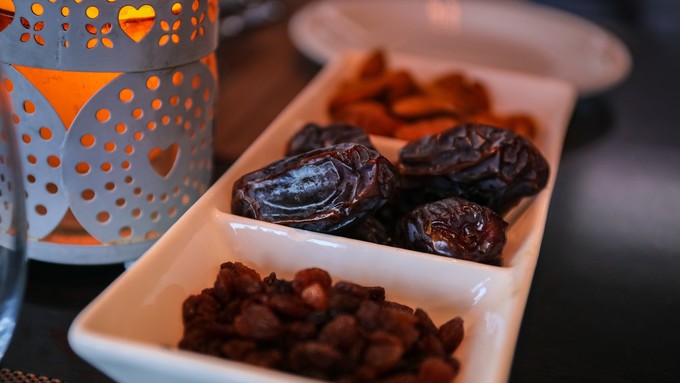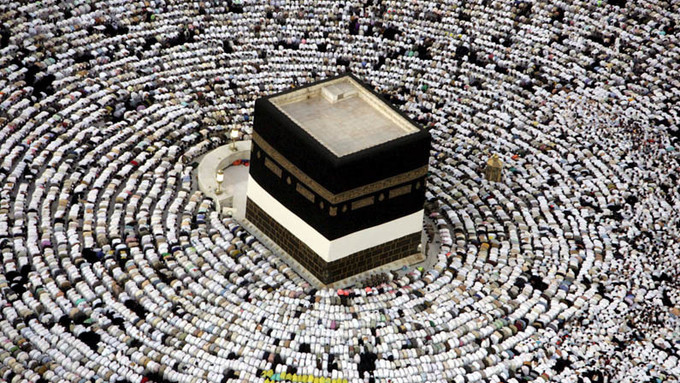Off to University! Ramadan Has Begun
Originally published in May 2017.
Ramadan is the Muslim’s university.
Each week is like a full year. The first week you are a ‘fresher’ – getting the feel of the month and learning your way around. In the second week, as a sophomore, you are in the groove and feeling confident. The third week you are a junior of Ramadan; you may begin to tire and need to reach deeply into your core self for strength and stamina. The last week, as a senior, you are both ready to graduate and feeling like you are not ready to leave. Where did the time go?
Freshers and Planning
The first year of university you learned the ropes, and in the first week of Ramadan it is time to establish the adab of fasting. The three most important rules of conduct in Ramadan are to break the fast with immediacy, to pray fervently (make dua) to Allah (subhanahu wa ta'ala) at the moment of fast breaking, and to delay suhūr (the pre-dawn meal) until the end of the night.
New students are always concerned about being liked by their colleagues and professors. They sign up for clubs and willingly participate in cheesy ice-breaker activities just to make friends. First week fasters, seeking to be favored and to be loved, need to plan to break their fasts on time. Abu Huraira (may Allah be pleased with him) tells us that the Prophet ﷺ said, “Verily Allah, may He be praised, said, ‘Indeed, the most beloved of my servants to me are those who hasten to iftar (breaking the fast).’”1
We can be popular and loved, and it seems so easy! Just hasten to break the fast. But is it? It means planning. It means that fasting becomes the focus of our day – what time is iftar? Where will we be? Will we have anything on hand with which to break our fast?
The great joke among parents of first year students is that they call home for money five minutes after we have handed them our monthly food budget. Freshers are needy. In Ramadan, first week fasters become aware of the bottomless well of their needs, and the overflowing river of blessings and answered du’a available to them in this blessed month. The Prophet ﷺ said, “Verily the one who is fasting has, at the moment when the fast is broken, a du’a (prayer) that is not refused.”2
This also requires planning. What do you really need? What will your du’a be this Ramadan? Who will you pray for? Remember to pray for health and strength, to be protected from a trial of faith, and for the Muslim ummah. Be ready with a list of dua and stand before Allah (subhanahu wa ta'ala) at that precious moment between the first swallow and a full partaking of the meal, and call out with confidence and an open heart.
One of the struggles of first year university students is figuring out how to do everything, do it on time, and do it correctly. Classes are available for learning – but students need to do the readings in order to benefit from them. Similarly, Ramadan fasting is available to change our lives and stretch our faith, but the Prophet ﷺ advised us to eat a meal called ‘suhur’ in order to access the blessing of the fast. Suhur occurs in the blessed time of night usually reserved for worship. He ﷺ said, “Eat suhur, for verily there is blessing (baraka) in suhur.”3
And again, we see the need for planning. We need to set an alarm, plan food that is quick and easy and (hopefully) nutritious. The blessing of suhur only comes when we eat it.
The first week of Ramadan, like the first year of University, will be a success if we practice these good manners of fasting: an immediate iftar, a fervent du’a, and a delayed suhur.
Sophomores and Consistency
The second week of Ramadan, like the second year of University, is when the life of learning really begins. In Ramadan, Taraweeh prayers and a complete recitation (khitma) of the Quran are part and parcel of a successful month.
Benefitting from our planning, we are now called upon to be consistent, steady and dependable.
Taraweeh is a Sunnah prayer prayed after Isha and before Witr. It can be prayed alone or in congregation. It is called ‘taraweeh’ because the souls find rest and comfort in this prayer. Abu Huraira (may Allah be pleased with him) tells us that the Prophet ﷺ said, “Who stands in Ramadan in faith and accountability, he is forgiven for his previous sins.”4 So our lesson in Ramadan is to stand in prayer after a long day of fasting. Sophomores have learned that they will have to keep studying after a long day of classes if they want to succeed. Likewise, standing in prayer after a long day of fasting is part and parcel of a successful Ramadan.
Ramadan is the month of the Qur'an, and just as Angel Jibrīl reviewed the Qur'an annually with the Prophet ﷺ (and twice in his ﷺ last Ramadan), it is time for us to read the entire Quran at least once. Sophomores look to their elders and mentors for examples of good study habits, and we can look to our early beloved mentors for examples of Ramadan Qur'an habits.
Imam Malik (may Allah have mercy on him) would halt his regular classes during Ramadan and turn to continuous recitation of the Qur'an. Imam Shafi’ would read two khitmas every day. Abu Hanifa, (may Allah have mercy on him) would free up his time in Ramadan for recitation and would complete 60 khitmas, one per night and another per day.
The Prophet ﷺ said, “The fast and the Qur'an intercede for the servant on the day of standing. The fast says, ‘O Lord! He refrained from food and desire in the day so accept him for my sake,’ and the Qur'an will say, ‘I prevented him from sleep at night, so accept him for me.’ And He will say, ‘They are accepted.’”5
Second week fasters who want to be at the top of their class need to focus on Qur'an and taraweeh prayers. Work to read more than one khitma in the month, following in the footsteps of our great early scholars, and pray Taraweeh whether you go to the mosque or not. This is the week of dependable work. The sophomore’s success is tied to grades and papers, and the second week of Ramadan can be called successful if we are getting our Ramadan homework done.
Juniors and Effort
The junior year…a year of advanced classes, extra hours of studying, Resident Assistance jobs and club presidencies.
The third week of Ramadan begins with the Battle of Badr. Occurring on the 17thof Ramadan, Badr was a critical moment in Muslim history. Unlike later battles, Badr was voluntary. Those who went out were faced with ridiculous odds – it looked very much like they would lose and be wiped off the face of the earth. But they stood by the Prophet ﷺ and Allah sent help in the form of angels.
In the junior week of Ramadan, we call on our inner strength and we show up for our very own Badr. We step up our effort. If we are tired, we pray twenty raka’as of Taraweeh anyway. We add extra night prayers, and we push forward in our khitmas.
In this third week of Ramadan, we fight our base selves and become generous. The companions asked the Prophet ﷺ “What is the best charity?” He answered, “The charity given in Ramadan.”6 As we remember the volunteers of Badr, we need to look around our own communities and volunteer. As they donated their lives, we must donate our time and money. It is time to feed people, donate to charities you admire, and give to those who do not ask. The third week of Ramadan, the junior week, is the week of winning the battle with ourselves.
After Badr, those who were present became a unique category of companion. The Prophet ﷺ said about one of the people of Badr, after he betrayed the confidence of the Prophet ﷺ, “He was present at Badr, and you do not know, perhaps Allah has looked upon the people of Badr and said: ‘Do what you wish, for I have forgiven you.’”7
As we go forth from our Ramadan, we can expect to make mistakes and perhaps (God forbid) betray the Sunnah of our beloved Prophet ﷺ. But if we have become a people of our own Badr, perhaps that work will sustain us, perhaps it will place us firmly in the category of those whom Allah has forgiven.
The junior year at University is known as the toughest year. The classes are more difficult and the results more important. Likewise, this third week of Ramadan is critical to a successful month. Badr reminds us of the effort needed. It is time to show up, to put forth more and more effort, and to give of our time, money and very lives to those in need. Fill this week with the battle against yourself and move to the next week ready to graduate.
Seniors and Preparation
Finally, the last week, and our senior year. It is almost over! Where did the time go? Senior year is for internships and preparing for life after college. The fourth week of Ramadan is for khalwa and seeking Lailat al-Qadr. One of the Tabi’een once said, “I am astonished that people have left seclusion (itikaf), for the Prophet ﷺ would do some things and then leave them, but he never left Itikaf until the day he died.”8 What would this tabi’i say about us today?
During the last week of Ramadan, it is time to step away from the world. Aisha (may Allah be pleased with her) was a witness to the Prophet’s ﷺ last days of Ramadan, and she said, “With the start of the last ten days of Ramadan, the Prophet ﷺ used to tighten his waist belt, pray all the night, and wake his family.”9 He set an example for us. In tightening his belt, he set aside worldly needs and focused his effort on worship. When he prayed all night, he showed us how to finish strong and prepare ourselves for the days that are around the corner, the days without the blessing of Ramadan. He woke his family to participate in these blessings, teaching us the importance of relationships and caring about the akhira of those close to us. He was not concerned that they ‘got enough sleep’ but rather that they ‘got enough prayer.’
I cannot count the number of times people have asked me “Did you sleep well?” “Are you rested?” “Do you need a nap?” and other probing questions around my sleep habits. But no one asks, “Was your prayer fulfilling last night?” “Are you satiated with worship this morning?” “Do you have the necessary light to get through the day?” Our culture has lost the deep understanding of the effects of night prayers. In this senior week of Ramadan, the Prophet ﷺ teaches us to focus on faith and let matters of this dunya stand and wait.
Just like a senior at University wants to land the right internship, a believer wants to land Lailat al-Qadr. The Night of Power, the night of answered dua, the night of revelation and reality.
A senior intern will not succeed at her internship because it is a cool place to work, she will succeed if she shows up and does the work. Similarly, Lailat al-Qadr is not a night of meaning, but a night to seek meaning. We must stand in prayer every night, pleading in fervent dua, and hope that we do that on the most important night of the year. An intern with a good position would be foolish to throw it away by tardiness and absenteeism. Do not lose out on your Lailat al-Qadr opportunity by sleeping through your last nights of Ramadan. Get up and perform! Do well and land the job! The job of representing our beloved Prophet ﷺ and his message.
Graduation and Eid
The last night of Ramadan, the night before Eid, is a night often lost to Muslims. The “night of reward” is often spent shopping, cooking, cleaning and sleeping instead of a last dizzying effort toward acceptance and forgiveness.
It is like the graduating senior who skips the last test because “he’s graduating”, only to find his GPA crash and his job prospects dwindle.
Eid is a Divine reward. It is a blessing and a giving to believers who have spent a month working for this moment. And to fully celebrate, start your Eid with a night of prayer. The Prophet ﷺ said, “Who stands on the two Eves of Eid seeking God, his heart will not die on the day that hearts die.”10
When the senior walks across the stage s/he receives her degree, proof of her accomplishment of the last four years. When the believer prays the Eid prayer, she receives her reward, proof of her accomplishment of the last four weeks.
Congratulations on your acceptance into the Muslim University of Ramadan. May you be successful and graduate in one month with a new state of being, a renewed faith, and a job offer from the Creator of all things. May you be employed in the work of His prophets, the work of spreading the message, caring for His creation, and uplifting the ummah. Ameen.
Faith & Spirituality Related Articles

5 Practical Steps To Get You Ready for Ramadan
As Ramadan is less than a month away, we might feel we often haven't done enough to prepare for it. Here are 5 things we can do right now during Shaban to make sure that we get the most out of Ramadan. The Prophet (Peace & Blessings upon Him & His Family) supplicated,” O Allah give us the blessings of Shaban and give us the treasure of Ramadan.”

Hajj at Home: Kindling the Spirit of Arafah
Even if we are not on Hajj this year, our situation is no different. We navigate through the complexities of our daily life, immersed in the never-ending responsibilities of work and family, inundated with the intrusions of technology and social media into every minute of our lives, moving from place to place and idea to idea.
